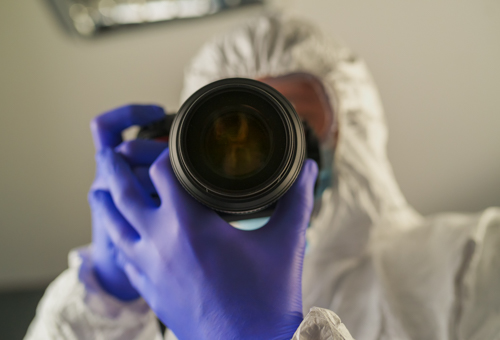

NCJTC offices will be closed December 24 - January 2 in observance of the upcoming holidays. We will be back to serve you in the new year on Monday, January 5, 2026. For information concerning continuing education units, please view our **[policies](https://ncjtc.fvtc.edu/policies#continuingeducation)** page.

November 13-17, 2023 | Burlington, VT
Access to this content requires approval.
Please watch your email inbox () for further instructions. You can expect to receive information regarding access within 1 business day.
Please watch your email inbox () for further instructions. You can expect to receive information regarding access within 1 business day.
You must add an organization to your profile before you can access this content.

November 13-17, 2023 | Burlington, VT
Gather up-to-date information for the investigation and prosecution of all types of child abuse cases utilizing a multidisciplinary team (MDT) approach. Learn about medical evidence, interviewing child victims/witnesses and adult suspects/witnesses, along with legal issues involved in the investigation and prosecution of child physical and sexual abuse cases. Discuss trends in offenders’ use of technology, the use of child sexual abuse material (CSAM), and sextortion. Learn law enforcement investigative techniques that capitalize on new technology.
Access to this content requires approval.
Please watch your email inbox () for further instructions. You can expect to receive information regarding access within 1 business day.
Please watch your email inbox () for further instructions. You can expect to receive information regarding access within 1 business day.
You must add an organization to your profile before you can access this content.
Registration deadline is October 15, 2023. Training Schedule: November 13 | 8:30 am - 4:30 pm Eastern November 14 | 8:30 am - 4:30 pm Eastern November 15 | 8:30 am - 4:30 pm Eastern November 16 | 8:30 am - 4:30 pm Eastern November 17 | 8:30 am - 12:00 pm Eastern **For information concerning continuing education units, please view our [policies](ncjtc.fvtc.edu/policies#continuingeducation) page.**
Upon completion or this training, you will be able to: * Describe the type of injuries a child may sustain and those that may or may not be as a result of abuse * Define child physical and child sexual abuse * Define characteristics of victims and offenders of child abuse * Describe preferred practices for interviewing minor victims and offending suspects * Describe legal considerations for investigating and prosecuting child physical and child sexual abuse cases
* Law Enforcement * Prosecutors * Social Workers * Tribes/Tribal Partners
The cost of lodging for non-federal attendees will also be covered the nights of November 12, 13, 14, 15 and 16. Class ends at 12:00pm on Friday, Nov. 17 Lodging arrangements will be made by MEC Training and TA. Attendees will be responsible for their own travel, food, parking and ancillary expenses associated with attending this training.
Tuition, student materials, and instructional costs are provided by the Missing and Exploited Children Training and Technical Assistance Program.
 Classroom
Classroom
 Classroom
Classroom
 Classroom
Classroom
 Classroom
Classroom
 Classroom
Classroom
 Classroom
Classroom
 Classroom
Classroom
 Conference
Conference
 Classroom
Classroom
 Classroom
Classroom
 Conference
Conference
 Classroom
Classroom
Sent successfully.
Our dedicated NCJTC staff will contact you within 2 business days of receipt of this request to discuss your needs and how we can help. We appreciate your interest in our training programs and look forward to serving you.
For questions, contact us at (855) 866-2582 or at info@ncjtc.org.
CloseError
If the problem persists contact us at (855) 866-2582 or send your information to info@ncjtc.org.
Go back to request

Topics: Focus on non-accidental injuries sustained by children. | Emphasize techniques used by investigators in assessment, investigation and reconstruction of fractures and soft tissue injuries. | Identify and demonstrate various weapons used by offenders. | Address circumstances and evaluation of children reported as victims or exhibiting signs and symptoms of sexual abuse.
Topics: Examine behavioral differences in physical abuse, domestic violence and child sexual abuse offenders. | Discuss power and control wheel and cycle of violence. | Discuss impact of relationship in child sexual abuse and exploitation cases, including familial, custodial, statutory cases and serial offenders. | Relate grooming and manipulation behaviors to victim dynamics, including, but not limited to: delayed disclosures, recantations, and physical evidence collection (or lack thereof).
Topics: Focus on roles and responsibilities of each member of the MDT. | Discuss response times and investigative activities of law enforcement and child protective services. | Highlight MDT coordination and communication.
Topics: Discuss interview strategies for non-offending caregivers and other witnesses in child abuse cases. | Provide investigative/assessment questions to assist teams in gathering comprehensive information. | Focus on gathering accurate information from children from first responder contacts throughout investigation. | Discuss preparing families for forensic interviews, disclosures, interviews versus interrogation, question types, child development, concrete and abstract concepts, and memory and suggestibility issues.
Topics: Focus on interviewing suspects including: types of suspect statements, interview locations, custody versus non-custody situations, timelines for interviews and the art of interrogation. | Establish the mechanism of injury and determining exclusive custody/access to the child. | Provide interview questions to assist both law enforcement and child protection in their assessments of different types of alleged abuse and exploitation. | Discuss the role technology plays in commission of sexual abuse crimes, including: child pornography, social media evidence, chat (including gaming) evidence, cellphones, geolocation, search warrants/preservation orders, and available resources to assist with the investigation. | Discuss use of technology by law enforcement and child protective services in investigations.
Topics: Discuss key issues in working together as a multidisciplinary team in preparing a case for trial then effectively presenting the case before a judge or jury. | Address common investigative techniques that should be considered in every child abuse case as they relate to court. | Discuss preparing the team for court and preparing children and other lay witnesses for testimony. | Discuss the use of experts at trial and common defenses raised in child abuse cases as well as arguments to dispel these defenses. | Discuss common legal issues in child abuse cases, including the impact of the “Crawford Decision”, 404B evidence, hearsay exceptions, pretrial motions for the State to consider filing, and how to improve the team after trial.

A hold has been placed on your account, which is preventing you from registering for this training. Please contact us at info@ncjtc.org or call us at 855-866-2582.

